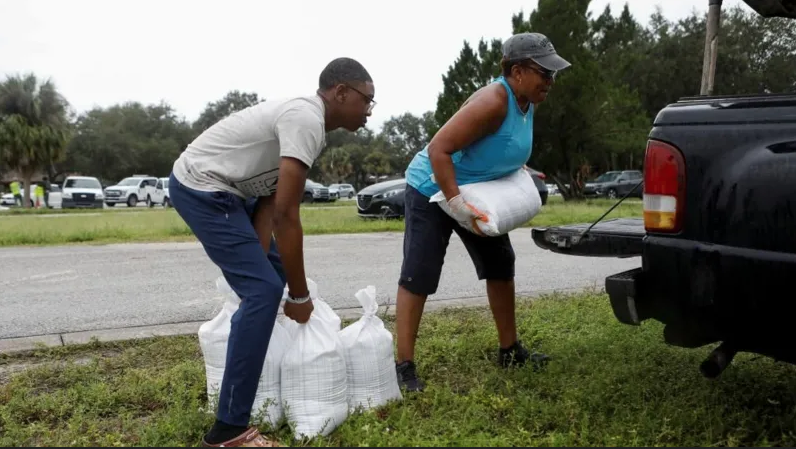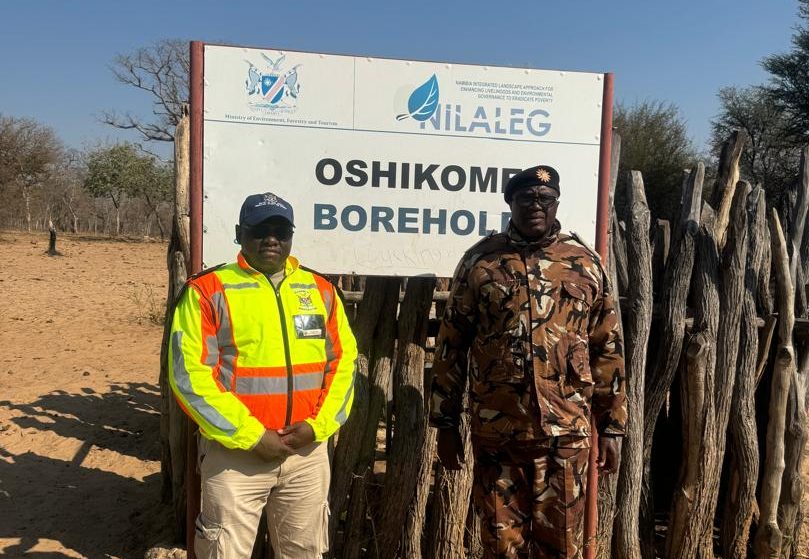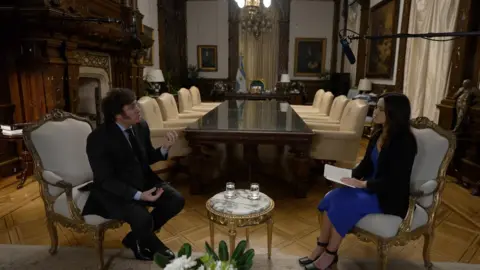Israel-Gaza war: ‘My children cling to me as dogs raid Rafah graves near our shelter’
Written by on May 6, 2024
The children hear the dogs snarling outside, just beyond the flimsy plastic of the tent.
The seven children of Rehab Abu Daqqa crowd around their mother. She is the last safe harbour in their lives. They have shared things, these children and their mother, which cannot be communicated to those who have not seen the things they have seen. Is there a word to express what a child feels knowing that just a few yards away, animals are dragging a body from a grave?
The vocabulary of childhood is inadequate amid the horrors of this emergency cemetery in Rafah.
Scared is the word Rehab Abu Daqqa uses.
WARNING: This report contains descriptions some readers may find disturbing
That is accurate. But there is more to it, she knows. The children have seen dogs eating the bodies. A human leg lying by a fence. So yes they are scared. But revolted too, and uncomprehending. The children who once had a home, went to school, lived according to the established rhythms of their family and community, are now refugees in a place that reeks of death.
“This morning the dogs took out a body from one of the graves and were eating it,” Rehab Abu Daqqa says. “From night until dawn the dogs do not let us sleep… our children keep holding on to me because of how scared they are.”
The dogs come in packs of dozens. Domestic pets whose owners are dead or displaced, mixed with Rafah’s existing population of strays, all of them now feral and scavenging for whatever they can eat. The cemetery has numerous shallow graves where people place their dead until a time comes when they can be taken to their home area. On some graves relatives have placed bricks to try to keep the dogs away from the dead.
Rehab Abu Daqqa is gaunt and exhausted. Her mouth and nose are covered by cloth to fend off the stench of the graves. She praises the young men who came earlier to reinter a body dragged out that morning.
“I don’t accept that me or my children should live next to a cemetery. My child is in the 3rd grade and today instead of playing a game he was drawing a grave and in the middle he drew a dead body. These are the children of Palestine… What can I tell you? Miserable, the word miserable doesn’t even explain it.”
The cemetery is one of several in Gaza that has become a refuge for people whose homes have been destroyed in the fighting. There are more than 1.4 million people crowded into Rafah – five times its pre-war population. According to the Norwegian Refugee Council that works out at 22,000 people for every square kilometre. Already disease is spreading, with outbreaks of diarrhoea, hepatitis A, and meningitis – as well as a continuing hunger crisis.
Rafah is where the refugees of Gaza reach the final wall, the border with Egypt which is closed to the overwhelming majority of the displaced. They arrive after being pushed from one place to another by the advance of the Israeli forces. Rehab Abu Daqqa has fled three times already and may soon have to uproot her family again if the Israeli Defense Forces (IDF) offensive on Rafah goes ahead.
Israel’s Prime Minister, Benjamin Netanyahu, has said a military operation in Rafah will go ahead “with or without” a ceasefire to destroy what he says are four Hamas battalions in the city. Hamas insists there can be no deal without a commitment to permanently end the war. Far right members of the Israeli coalition cabinet are warning Mr Netanyahu against compromise. The Finance Minister, Bezalel Smotrich, a standard bearer for the settler movement, has called for “absolute destruction” in Rafah, saying there can be no “half work”.
“Where do they [refugees] move to? ” asks Dr Rik Peeperkorn, regional director of the World Health Organization (WHO), who recently returned from Rafah.
Dr Rik Peeperkorn from the WHO warns that an offensive in Rafah would lead to another humanitarian disaster on top of the existing one.
“We already have a crisis in health. We have a water and sanitation crisis, a food crisis. There’s a humanitarian disaster. So, there’ll be just another humanitarian disaster on top of this… What we expect will be substantial additional mortality and sickness when a military incursion happens. So, a lot more people dying… a lot more death and a lot more diseases.”
Dr Peeperkorn worked for seven years in Afghanistan with the UN and is not a man who is easily daunted. But when we met in Jerusalem he looked tired. The tiredness of a man who wakes every morning to the certainty of a crisis that seems to threaten ever worse consequences.
The WHO is already preparing for additional field hospitals to help if people are forced to move. But what happens to the seriously ill and the elderly, the 700 kidney dialysis patients who are currently being treated in a facility which once used to cater to 50?
“If you look at our health sector, it is crippled already and an incursion will actually mean that we lose another three hospitals… like they cannot be reached, they might be damaged, they might be partially destroyed. We are preparing for it with a contingency plan which is like a band aid.”
A boy receiving treatment at the European Hospital in Rafah
My BBC colleagues have provided graphic evidence of the conditions inside hospitals, filming day after day throughout the war. At the European Hospital in Rafah families are camped in any space they can find, in the grounds and inside. They prepare meals in wards. Their children roam along the darkened corridors, past the wounded being wheeled on trollies, an old woman sitting on her own staring into the distance.
In the emergency care ward, 11-year-old Yassin al Ghalban is crying on his bed. His legs are gone, amputated below the knee after an air strike. A relative standing by the bed says, “he is surviving on painkillers”.
11-year-old Yassin al Ghalban lies in a hospital bed at the European Hospital in Rafah
At the cemetery, Rehab Abu Daqqa watches her children play a few yards from the graves. The dogs are gone but the children keep close to their mother. Soon she will be on the move again because she cannot bear for her children to stay in this place.
There is no talk of hope here. Hope in Gaza departs at different speeds according to your circumstances. It can vanish in a second with the killing of a loved one. Or it can depart incrementally, hour after hour, as you are pushed from one squalid camp to another, and words fail as the questions from the children pile up.
Additional reporting by Alice Doyard and Haneen Abdeen
The post Israel-Gaza war: ‘My children cling to me as dogs raid Rafah graves near our shelter’ appeared first on The Namibian.



